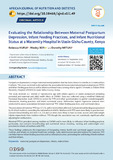Evaluating the Relationship Between Maternal Postpartum Depression, Infant Feeding Practices, and Infant Nutritional Status at a Maternity Hospital in Uasin Gishu County, Kenya

View/
Date
2023-10Author
KURUI, Rebecca
BOR, Wesley
MITUKi, Dorothy
Metadata
Show full item recordAbstract
Postpartum depression is a major maternal mental problem that has been shown to contribute to malnutrition
in infants. This cross-sectional study explores the association between maternal postpartum depression (PPD)
and infant feeding practices as well as infant nutritional status among infants aged 6-14 weeks at Eldoret West
Maternity Hospital (EWMH) in Uasin Gishu County, Kenya.
The study involved 257 women of reproductive age with infants aged 6-14 weeks postpartum attending
postnatal and maternal and child health clinics at EWMH. Data was collected using a modified Edinburgh
Postnatal Depression Scale (EPDS) to screen for PPD and other questionnaires to gather sociodemographic
information, feeding practices, and infant nutritional status. Multivariate logistic regression analyses were
conducted to assess associations between maternal PPD, infant feeding practices, and nutritional status.
The prevalence of maternal PPD was 17.5%, with 1 in 6 mothers affected. Exclusive breastfeeding was practiced
by 94.6% of mothers, exceeding the national level of 60%. Mothers with PPD were more likely to practice nonexclusive breastfeeding and were 1.4, 1.8 and 1.6 times more likely to have stunted, wasted and underweight
infants respectively than mothers without PPD though the association was not statistically significant after
adjusting for confounders.
Maternal PPD is prevalent among mothers at EWMH and is more likely to influence infant feeding practices
particularly non-exclusive breastfeeding and nutritional status. Stunting, wasting and underweight were
prevalent in infants of mothers with PPD.
These findings underscore the importance of integrating mental health and nutritional support services for
mothers and infants in maternal healthcare settings. Early identification and intervention for maternal PPD
can help improve infant feeding practices and nutritional outcomes, promoting the well-being of both mothers
and their infants.
